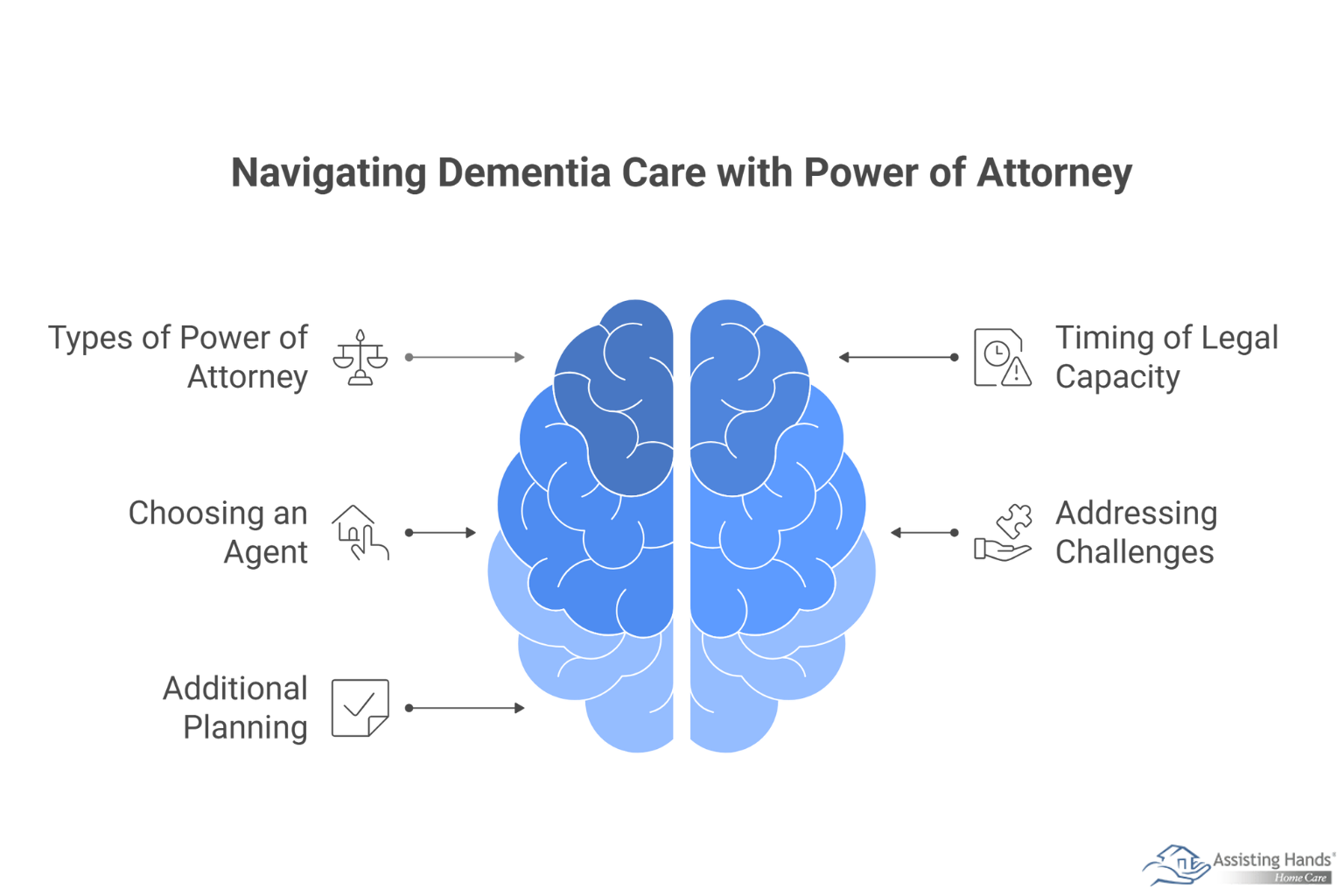
Table of Content
When a senior loved one receives a dementia diagnosis, families face numerous legal and financial decisions that require immediate attention. Understanding power of attorney becomes crucial for ensuring your loved one’s wishes are respected and his or her affairs are properly managed as the condition progresses.
Understanding Different Types of Power of Attorney
Power of attorney documents grant legal authority to make decisions on someone else’s behalf, but not all types serve the same purpose. Choosing the right type depends on your loved one’s current cognitive abilities and future care needs.
Financial power of attorney allows the designated person to handle banking, investments, bill payments, and property transactions. This becomes essential when dementia affects the ability to manage money or understand financial consequences.
Healthcare power of attorney grants authority to make medical decisions, including treatment choices, medication organization, and care facility selection. This power typically activates when doctors determine the person cannot make informed healthcare decisions.
Durable power of attorney remains valid even after the person becomes incapacitated, making it the most important type for dementia situations. Without the “durable” designation, the power of attorney becomes invalid once cognitive decline begins, leaving families without legal authority to help.
Making decisions for your loved one may include hiring a home caregiver to ensure your parent’s safety and comfort. Families looking for top-rated home care service providers can reach out to Assisting Hands Home Care. From respite care to specialized Alzheimer’s, dementia, stroke, and Parkinson’s care, there are many ways we can make life easier for seniors and their loved ones.

Timing Matters: Acting while Mental Capacity Remains
The window for establishing power of attorney closes once dementia significantly impairs judgment and decision-making abilities. Legal capacity requires understanding the nature and consequences of the document being signed.
Signs your loved one may still have legal capacity include:
- Recognizing family members and understanding relationships
- Comprehending basic financial concepts and consequences
- Expressing consistent preferences about care and finances
- Understanding what power of attorney means and why it’s needed
If you suspect cognitive decline, consult with an elder law attorney immediately. The attorney can assess your loved one’s capacity and ensure documents meet legal requirements. Waiting too long may require expensive and emotionally difficult guardianship proceedings through the courts.
Helping your loved one create a power of attorney isn’t the only potentially overwhelming responsibility you may have to face. One of the most challenging tasks of helping an elderly relative age in place safely and comfortably is researching agencies that provide elderly home care. Columbus families can turn to Assisting Hands Home Care for reliable, high-quality in-home care for aging adults. We offer 24-hour care for seniors who require extensive assistance, and we also offer respite care for family caregivers who need a break from their caregiving duties.
Choosing the Right Agent
Selecting someone to serve as power of attorney requires careful consideration of practical skills, availability, and family dynamics. The person you choose will make critical decisions affecting your loved one’s quality of life and financial security.
Consider these qualifications when choosing an agent:
- Strong organizational and financial management skills
- Geographic proximity or ability to travel when needed
- Emotional stability to handle difficult medical and financial decisions
- Understanding of your loved one’s values and preferences
- Ability to communicate effectively with healthcare providers and family members
Many families choose one person for financial matters and another for healthcare decisions, particularly when different individuals have relevant expertise. Having backup agents designated prevents complications if the primary agent becomes unable to serve.
Common Challenges and How to Address Them
Even properly executed power of attorney documents can create family conflicts and practical difficulties. Understanding potential challenges helps families prepare for smooth implementation when the time comes.
Family disagreements about care decisions often arise when siblings have different opinions about treatment or living arrangements. Clear communication about your loved one’s documented wishes and regular family meetings can reduce conflicts. Consider involving a neutral third party, such as a social worker or family counselor, when tensions escalate.
Financial institution resistance sometimes occurs when banks or investment companies question the agent’s authority. Keep original documents easily accessible and provide copies to all relevant financial institutions before they’re needed. Some banks offer power of attorney registration services that streamline future transactions.
Healthcare provider challenges may arise when medical professionals are unfamiliar with your power of attorney documents. Provide copies to all doctors, hospitals, and care facilities involved in your loved one’s treatment. Ensure the healthcare agent accompanies your loved one to important medical appointments to establish relationships with providers.
Planning Beyond Power of Attorney
While power of attorney addresses immediate decision-making needs, comprehensive dementia planning requires additional legal documents and advance preparation. These supplementary measures ensure your loved one’s complete protection and your family’s peace of mind.
Essential additional documents include advance directives that specify end-of-life preferences, HIPAA releases allowing access to medical information, and trusts that protect assets while ensuring care funding. Many families also benefit from long-term care insurance purchased before cognitive decline begins.
Consider creating a comprehensive care plan that documents your loved one’s daily routines, medication schedules, favorite activities, and behavioral triggers. This information becomes invaluable for future caregivers and family members making decisions on your loved one’s behalf.
A highly trained caregiver with experience in caring for seniors with dementia can be a fantastic resource for family members. Aging in place can present a few challenges for seniors living with dementia. However, they can still live independently at home with the help of professional dementia care. Columbus families can rely on Assisting Hands Home Care to provide their elderly loved ones with mental and social stimulation, timely medication reminders, assistance with meal prep, and much more. Our caregivers are available around the clock to help your loved one live a happier and healthier life. To create a comprehensive in-home care plan for your loved one, give us a call today.






